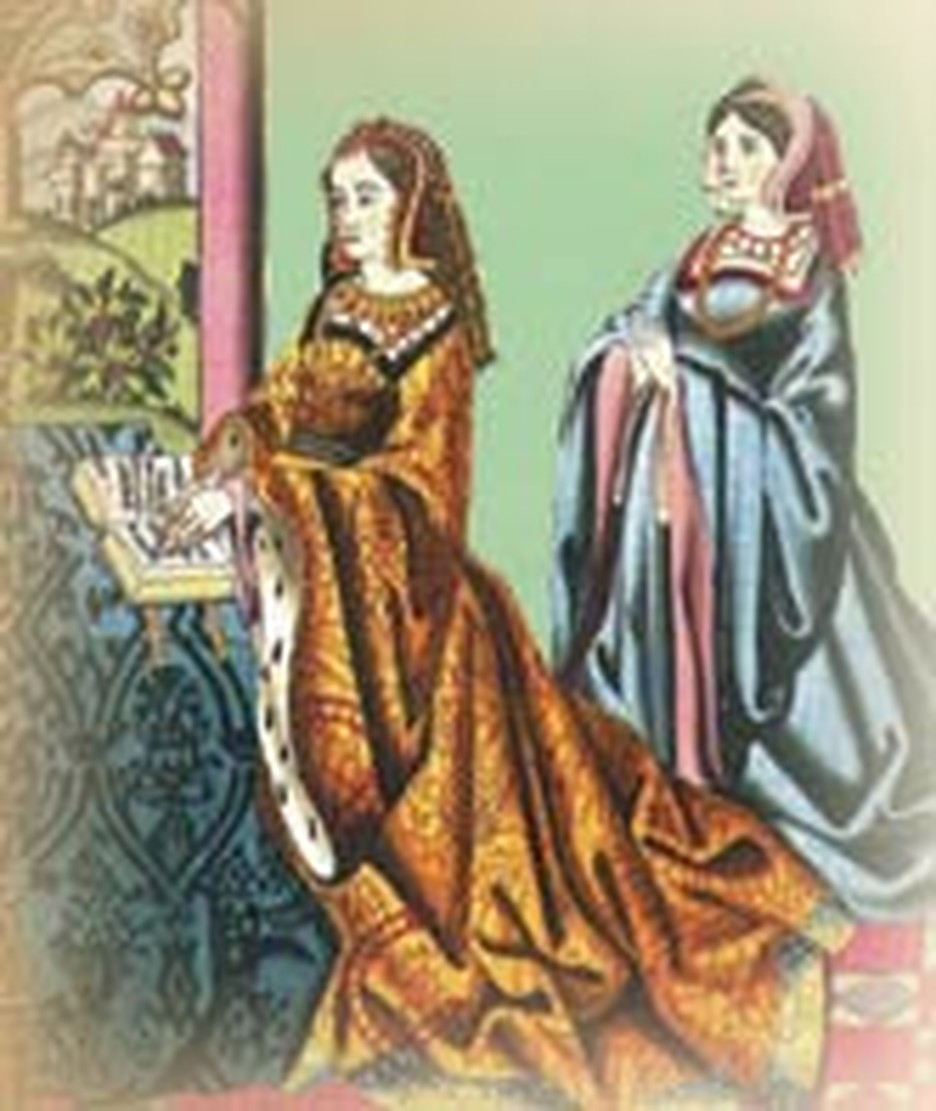
Fourteen Ninety Two, that famous year Columbus sailed the ocean blue into the New World, was the same year Argula von Stauff was born into the Old World. Though relatively unknown today, Argula was a powerful presence in the early years of the Reformation. Her knowledge of Scripture and conviction of truth compelled her to stand courageously against university leaders, city councils, and noblemen.
Argula became the first Protestant woman writer and effectively harnessed the printing press to publish pamphlets for her cause. The von Stauff family had the privilege of being independent lords in Bavaria, Germany accountable only to the Emperor. Education was valued in the von Stauff home, even for girls, and Argula was taught to read early. When she was ten her father gave her a beautiful, expensive Bible in German. Franciscan preachers, however, discouraged Argula from any Bible study, warning her that she would become confused if she tried to understand it.
As a young girl, Argula joined the court in Münich and became a maid-in-waiting to Queen Kunigunde, sister of the Emperor Maximillian. There was a great interest in spiritual affairs at the court that Argula would have absorbed. Here she probably began reading and studying the Bible in earnest. John von Staupitz, the Augustinian mentor of Martin Luther, spoke frequently at court and dedicated his Handbook on the Love of God to Kunigunde. Staupitz wrote that Christ's merits, not ours, bring us salvation. He criticized many of the superstitions of the day and emphasized the Christian must be more concerned with fulfilling the spirit of Christ's commandments than the letter of the law.
While still in her teens Argula suffered a series of tragedies that undoubtedly sent her to the Scriptures to find comfort and strength. In 1509 when she was 17 years old, both of her parents died of the plague. Her uncle Hieronymus became her guardian, but he became caught up in political intrigues at the Bavarian Court and was executed in 1516. That same year Argula married Friedrich von Grumbach, of an old Frankish family. Friedrich was administrator of Dietfort and had other land holdings throughout Bavaria. Argula and Friedrich had four children: George, Hans Georg, Gottfried, and Apollonia.
A Mixed Marriage
Argula took the initiative and placed all of the children in Protestant schools. George, the oldest, studied in Buremberg and Wittenberg, where he stayed for a time with Luther's close associate, Philip Melanchthon. Argula maintained contact with the Wittenberg leaders of the Reformation, Melanchthon, Luther, and Spalatin, but her husband did not accept the Reformation and remained Roman Catholic. This undoubtedly caused difficulty in Argula's marriage. In one of her writings Argula sighed, "May God teach me to understand how I should act towards my man."
While remaining faithful to her husband, Argula could not refrain from standing firm for the teachings she was discovering in the Scriptures. Barrel loads of Lutheran books were imported into Bavaria during this time, and many informal groups met to discuss them. Argula studied many of the pamphlets from Wittenberg and reread the Scriptures in the light of them. Through her von Stauff relatives she also came in contact with reforming scholars and priests near her home. In 1522 Argula's younger brother Marcellus began attending the University of Ingolstadt. Marcellus undoubtedly informed his sister of the affair of Arsacius Seehofer.
The Arsacius Affair
In March 1522, the Bavarian Court at Münich issued a mandate against the reception of Lutheran ideas. Arsacius Seehofer had been to Wittenberg and studied under Luther's associate Philip Melanchthon. He brought back many of Luther's writings to the University at Ingolstadt where he attended as a student and stayed on after graduation to teach. He introduced Reformation teachings into his lectures. Ingolstadt's most notable faculty member was none other than John Eck -- the erstwhile academic foe and capable prosecutor of Luther. This was no place to espouse the controversial ideas from Wittenberg. So in December, 1522 Arsacius was arrested, forced to renounce Luther's teachings and confined in the Ettal monastery.
Argula was outraged by such persecution and consulted Andreas Osiander of Nuremberg about what could be done. Though what advice Osiander gave is unknown, we do know that Osiander was very impressed with Argula's depth of Scriptural knowledge. On September 20, 1523 Argula sent a long letter to the Rector and Council of Ingolstadt University challenging them to show what heresy there was in any of Arsacius' reforming views. She urged the university to follow the Scriptures, not Roman traditions. That a woman would have the audacity to address the university leaders of the day was shocking. But even more astonishing were her wisdom, logic, and use of Scriptures.
Argula Argues Her Case
Argula wrote that, though a woman, she was compelled to speak out and challenge the university's actions. Men had remained silent in the case, but she could not allow the Gospel to remain stifled. In Matthew 10:32, Jesus said "Whoever confesses Me before men, him I also will confess before My Father who is in heaven. But whoever denies Me before men, him I will also deny before My father who is in heaven." Ezekiel 33 says, "If you see your brother sin, reprove him, or I will require his blood at your hands." So Argula felt that under God she had no choice. She must speak: How in God's name can you and your university expect to prevail, when you deploy such foolish violence against the word of God; when you force someone to hold the Holy Gospel in their hands for the very purpose of denying it, as you did in the case of Arsacius Seehofer?
Not Just Women's Chit-chat
In her letter Argula cited over 80 Scriptures. Indeed, her letter is largely a stringing together of Scriptures applicable to the situation. She placed the human wisdom of the university along side the words of Scripture and found the human wisdom foolish in the sight of God. For Argula the Scriptures were supreme and superior to the tradition, customs, and authority of the University. She concluded her letter with the words: What I have written to you is no woman's chit-chat, but the word of God; and (I write) as a member of the Christian Church, against which the gates of Hell cannot prevail. Against the Roman, however, they do prevail. Just look at that Church! How is it to prevail against the gates of Hell? God give us grace, that we all may be saved, and may (God) rule us according to his will. Now may His grace carry the day.
A Quick Sensation, a Harsh Reaction
Argula's letter was briefly circulated in manuscript, then it was printed as a pamphlet. It became a quick and notable sensation. Within two months it went through fourteen editions. The Ingolstadt theologians were furious at this attack on them and wanted "the silly bag tamed." Counselors to Duke Wilhelm advised him of the dangers of leaving the "female devil" unpunished. Argula had no position herself, so Duke Wilhelm punished her husband, since he was responsible for her, by relieving him of his post as administrator of Dietfort. This put Argula's family under a financial strain and undoubtedly increased the tension in Argula's marriage. Professor Hauer preached a sermon lambasting her in caustic term. Among Reformers, however, Argula was admired. Balthasar Hubmaier, preacher in nearby Regensburg at the time, wrote that Argula von Stauff "knows more of the divine Word than all of the red hats (canon lawyers and cardinals) ever saw or could conceive of." Hubmaier compared Argula to heroic women in the Bible. Though Argula's letter angered many, the University of Ingolstadt did not think it worthy to answer the woman's attack.
Undeterred, in November, 1523 Argula traveled to Nuremberg to encourage princes attending the Reichstag to accept the Reformation principles. It was very unusual for a woman by herself to lobby and write pamphlets for any cause, but Argula's confidence in the Scriptures gave her courage. As she wrote to Spalatin, chaplain to Frederick the Wise, "Have no anxiety; God is in control. He knows how things are and will preserve us; he who protects Israel slumbers not (Psalm 121:5). It is all in his hand; he will calm the troubles and bring matters to a good conclusion." In 1530 Argula traveled to Coburg to meet with Martin Luther, who had earlier written her encouraging letters. Argula then went on the convention in Augsburg, where she arranged a meeting between Melanchthon and Bucer to try to settle their differences over the Lord's Supper. Argula's public life, however, was largely at an end.
In 1530 her husband Frederick died. In 1533 she married Count von Schlick, who was more sympathetic to the Reformation, but he died two years later. Three of her children also died before Argula's own death in 1568. Argula's letter writing and lobbying did not succeed in establishing Reformation principles in Bavaria, and the Roman Church in the region increasingly repressed those who opposed its beliefs and practices. Nevertheless, Argula's voice had been important. She boldly spoke up for the supremacy of Scriptures and the priesthood of all believers (including women). She sought an open discussion in the language of the people between lay people and theological leaders on the Bible's teaching on morality, law, and politics. As Argula wrote in her letter to the University of Ingolstadt: The Lord says, John 12, 'I am the light that has come into the world'. . . . It is my heartfelt wish that this light should dwell in all of us and shine upon all callous and blinded hearts. Amen.
Dear Sirs . . . Excerpts from Argula's 1523 letter to the faculty at Ingolstadt
To the honorable, worthy, highborn, erudite, noble, stalwart Rector and all the Faculty of the University of Ingolstadt: When I heard what you had done to Arsacius Seehofer under terror of imprisonment and the stake, my heart trembled and my bones quaked. What have Luther and Melanchthon taught save the Word of God? You have condemned them. You have not refuted them. Where do you read in the Bible that Christ, the apostles, and the prophets imprisoned, banished, burned, or murdered anyone? You tell us that we must obey the magistrates. Correct. But neither the pope, nor the Kaiser, not the princes have any authority over the Word of God. You need not think you can pull God, the prophets and the apostles out of heaven with papal decretals drawn from Aristotle, who was not a Christian at all. . . .
You seek to destroy all of Luther's works. In that case you will have to destroy the New Testament, which he has translated. In the German writings of Luther and Melanchthon I have found nothing heretical. . . Even if Luther should recant, what he has said would still be the Word of God. I would be willing to come and dispute with you in German. . . . You have the key of knowledge and you close the kingdom of heaven. But you are defeating yourselves. The news of what has been done to this lad of 18 has reached us and other cities in so short a time that soon it will be known to all the world. The Lord will forgive Arsacius, as he forgave Peter, who denied his master, though not threatened by prison and fire. Great good will yet come from this young man. I send you not a woman's ranting, but the Word of God. I write as a member of the Church of Christ against which the gates of hell shall not prevail. . .
So, Which Was She?
The Ingolstadt Theologians said about her . . .
A silly bag
Wretched and pathetic daughter of Eve
A female desperado
An arrogant devil
A shameless whore
Reformer Balthasar Hubmaier said about her . . .
A pious woman
A Christian woman Knows the Divine Word better than clergy
Like Deborah and Hulda in Old Testament
Like daughters of Philip in New Testament








